If you have a pond with goldfish and still have plenty of room for more, but want to spice things up a little, then there are a few different fish that can live with them.
In this list, we will give some examples of fish that can live with goldfish, and we will give some top care tips, explain why they are ideal to live in ponds with goldfish and any additional things you need to know.
Can different species of fish live together in a pond?
Yes! There are different species of fish that can live in a pond other than goldfish and koi.
Depending on where you live in the world, the list of what types of fish you can keep outside will greatly vary.
For our list, we will largely cover what you can keep in temperate climates.
We will list fish that can be kept outside over winter, or that can live out in spring, summer and autumn, but will need taking indoors in freezing temperatures.
We will also be sticking to fish that are ideal with goldfish, so no predators or aggressive fish like pike or large catfish which would make snacks out of your goldfish!
Benefits of having goldfish pond mates
You may want to add other fish to your pond for a number of reasons, some fish can be highly beneficial to the ecosystem of your pond. Some animals, like crayfish and snails, can eat pest algaes and help to keep your pond clean.
Grass carp will eat things like blanketweed and overgrowing reeds, keeping the pond from clogging up with plantlife and maintaining an open, clean pond.
Loaches can help to remove pest snails if they get out of hand, but remember, they can’t stay out year round if you get freezing winters.
Sturgeon will help keep the floor of a pond clean by picking up scraps of food and small animals living within the substrate.
Why should you keep other species of fish with goldfish?
As mentioned, there are a couple benefits to keeping other species with goldfish. However, they aren’t necessary for the fishes or the pond’s survival.
Goldfish will actually take care of all the jobs listed above that the other fish also do – they eat off the surface and off the floor, keeping the pond free from leftover food, which could rot.
Goldfish will also eat algae and blanketweed if they are hungry.
Goldfish will also eat duckweed, baby snails and snail eggs.
Keeping other species of fish with your goldies is entirely up to you. Other fish can look nice together with them, but it is not needed.
One thing goldfish can’t do however, is digest decomposing or rotten material – no fish can do this!
But invertebrates like snails can, which makes them ideal pond mates for goldfish as they are superb cleanup crew.
We actually highly recommend keeping pond snails with your goldfish, as they will make your life in maintaining the pond much easier!
Best pond mates for goldfish
Koi Carp
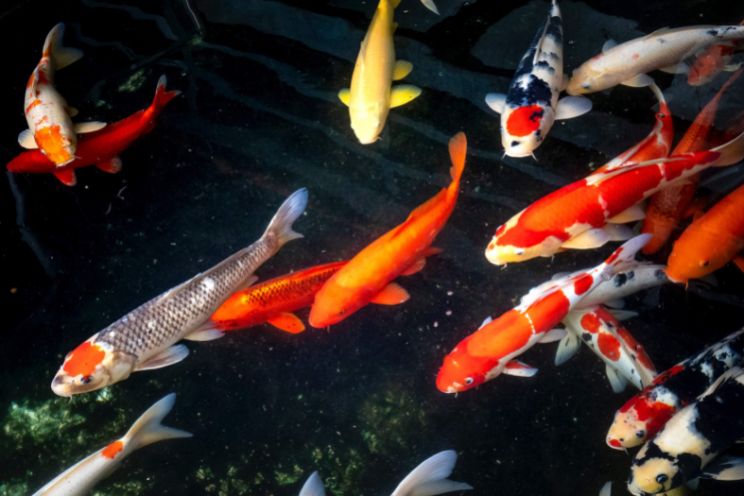
Can koi and goldfish live together?
Koi are the number 1 go to goldfish pond mate.
Their care is virtually the same, they have the same water conditions, same environment, same diet, etc.
This is because Koi and goldfish are closely related, as they share a common ancestor – the two species can actually interbreed and produce a hybrid!
Just remember that Koi will grow significantly larger than your goldfish; they can grow up to 3ft and can live longer than them too, on average over 35 years!
There was once a Koi measured to be over 200 years old upon its death!
Like goldfish, there are many varieties of koi, but usually, they do not encroach upon the physical shape of the koi much, unlike fancy goldfish, which have been bred to have distorted backs, extended eyes and oddly shaped tails, which impede their swimming abilities.
This means that koi will be more streamlined and agile than a fancy goldfish and will always get to food first. For this reason, we only recommend keeping comets and shubunkins with koi, as they can compete with them much better.
Orfe
Another species related to goldfish and carp, Orfe again live very similar lifestyles to goldfish. They do however, like to school more closely and enjoy living in big groups, this can be a problem for people with small ponds as Orfe get around 2ft in size.
They like big open spaces to swim in their schools, so a very large pond is required for them.
But they can live outside year round, have the same diet as a goldfish and are generally very placid.
Stickleback
These are a small species of fish related to seahorses, but unlike their cousins, they can live in pure freshwater and can breed in it.
These fish are very hardy, but are small, only getting around 2” – 3” in size and do not live long lifespans (only around 18 months).
Keeping them with goldfish is risky as they may be eaten, but if you do decide to keep them together, they eat small invertebrates like worms and mosquito larvae and will stay around the bottom of your pond.
They can also stay outside year round, but we will add that while possible, they don’t do particularly well with goldfish – they are often outcompeted by them and live under their shadow.
You may never see them if you add them to your goldfish pond, as they will hide all the time.
Dojo loach
The dojo loach, or weather loach, is often kept with goldfish in aquariums; they pair very well together as they occupy different parts of the tank.
Dojo loaches can also live within an outdoor pond, however, there are restrictions to this. Unless your pond is very deep, we recommend taking the loaches inside over winter – this is because they come from temperate parts in east asia, where the winters aren’t as strong.
While they may be able to survive mild winters, the risk of mortality is high in a place like Northern England, Scotland, Texas and Canada, where temperatures drop very low in winter.
It may also be banned to keep dojo loaches in your pond if you live in a protected area – be careful if you live in Australia or New Zealand, as weather loaches can be invasive. They can actually escape into waterways during floods and damage the ecosystem.
Are Weather Loaches banned in the UK?
In the UK, you can also be prosecuted for selling dojo loaches without the proper paperwork. but you are legally allowed to keep them in your pond and buy or give them to pet stores.
If you do decide to keep loaches in your pond, they will eat bloodworms, sinking pellets and snails, and do quite well in big ponds, reaching much larger sizes than usual (around 8” or more!)
Sturgeon and sterlet
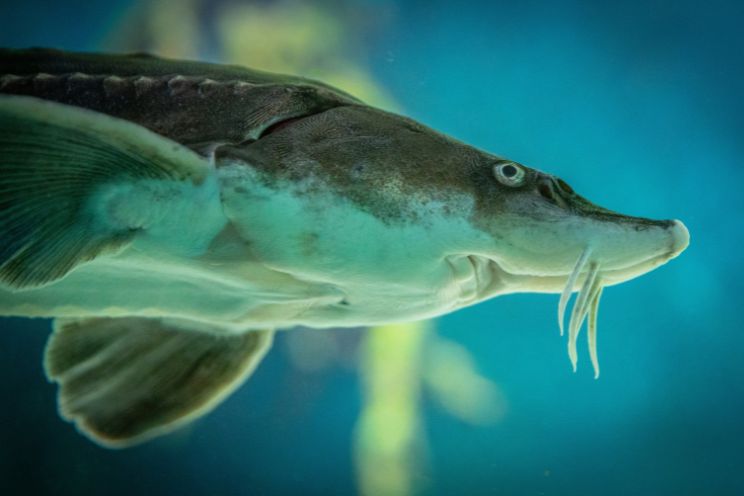
Both of these fish are very similar. Sterlets are slightly smaller than Sturgeon, but they both have the same diets and care requirements.
They are not related to carp in any way and are part of their own family. They live in large lakes, rivers, river deltas and seaways.
These fish resemble catfish in their appearance and diet and they spend their lives skulking around the substrate looking for worms and crustaceans to eat.
These fish are ideal as they can live through winter, do not bother goldfish and are fairly standard care for a pond fish.
They do however, grow large… very large! With some sturgeon reaching above 7ft, but most sterlets will grow around 36” which makes them the better option for most ponds.
Fathead minnow
Another member of the carp family, these guys only get around 3”. They are native to parts of North America and have quite a large expanse in territory.
They make good pond mates as they can survive freezing temperatures, have a similar diet to goldfish and aren’t aggressive.
However, much like Sticklebacks, because they are small, they may not come out much and may be shy, sticking to the rocks and plants.
Grass carp and Common carp
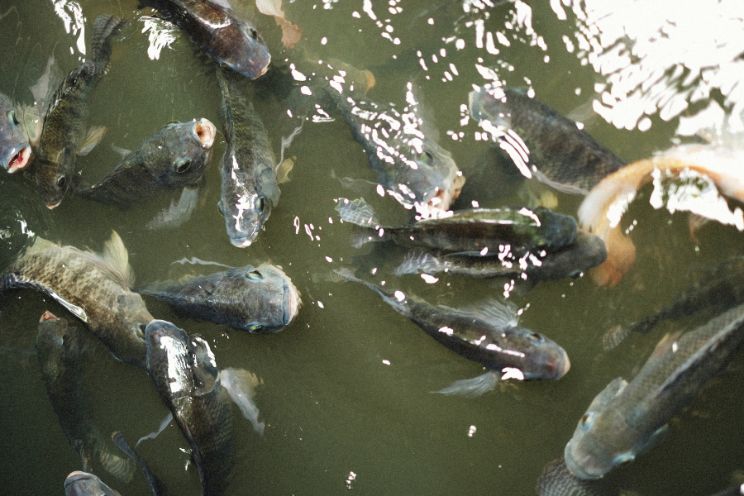
You may notice that most of the fish from this list are carp or are at least related to them; this is because they all share a similar lifestyle to goldfish, making them ideal as they can survive in the same environment and live on the same food.
Grass carp are very similar to Koi in that they are very closely related to goldfish. Common carp can also interbreed with goldfish in rare cases, but this isn’t very common.
Both common and grass carp have near enough the same care, can survive over winter and get large.
Common and grass carp can reach a size of over 3ft!
Frogs
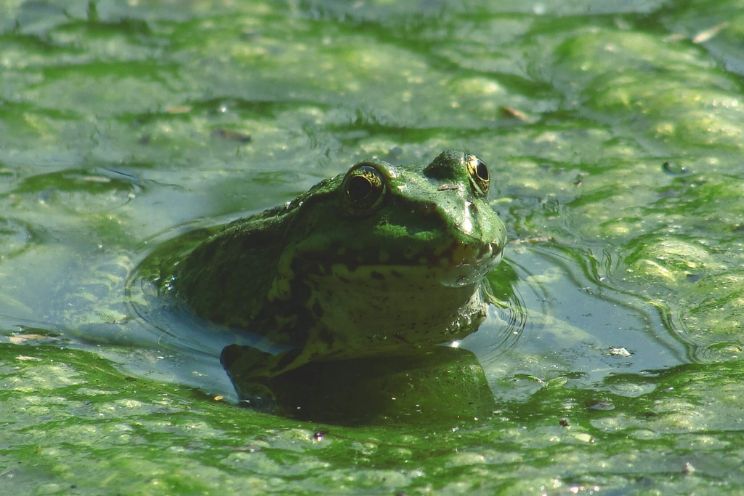
Although not a fish, frogs can also make ideal pond mates for goldfish, so long as they are a similar size and do not eat the goldfish.
Both fish and frogs can live together peacefully in most cases.
Take a look at our guide specifically on frogs and goldfish as pond mates if you are interested!
Snails
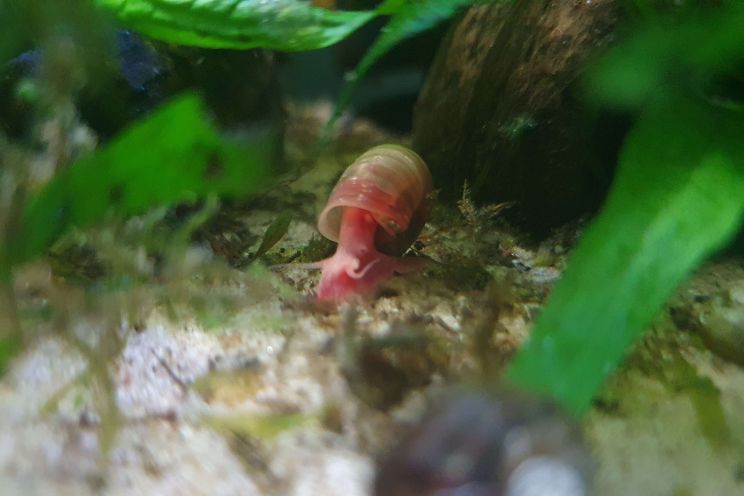
Again, not a fish, but snails are excellent pond mates for goldfish as they are the perfect cleanup crew. They produce little waste while feeding on all the dirt that the goldfish leave behind.
Snails will also eat algae and blanketweed and are super easy to care for.
However, eggs and baby snails will be eaten by goldfish, which is good for controlling population. Some will survive, but not as many as there normally would.
What fish should you avoid putting in a pond with goldfish?
There are also many fish that you should absolutely not put with your goldfish. While sometimes this can be done in large ponds, it is done at one’s own risk of losing the fish, or subjecting them to high levels of stress.
We do not condone this and we do not recommend keeping these fish with your goldfish either because it will cause stress, the fish will be eaten, or the fish require different water conditions than an outdoor goldfish pond can provide.
Livebearers
While they can sometimes live in a tank with goldfish, livebearers like Platies and Guppies do not fare well in outdoor ponds over cooler months. In some places, even in summer, they do not do well, as the night time temperature drop can be too much.
But what about variatus platies? They are cold water right?
While variatus do prefer cooler temperatures than their tropical cousins, they are a temperate fish, and don’t like temperatures below 14C 57F; cold winters and autumns will kill them.
Tetras, Danios, Rasboras
None of these fish make ideal pond inhabitants if you live in a cold climate, most of them are from South America, East Asia and Africa, where the temperatures are regularly at around 27C or 80F.
Many of them are also very small and would be eaten by goldfish quite easily.
Ricefish, Killifish and Labyrinth fish
Due to the small size and water requirements of these fish, they would be easily eaten by your goldfish, and none of them fare well in cold winters.
The only one in this list that might do well are Ricefish, but only specific varieties of them like Platinum Ricefish. However, they will still be eaten by goldfish and can still die during a particularly cold winter.
Killifish don’t do well in ponds with cold temperatures, strong currents and large fish, so would die quickly in a pond.
Labyrinth Fish like Gourami and Betta would also not do well for the same reasons as Killifish. These fish can also be quite territorial and may pick fights with your goldfish, or have their long extremities, like their tails and elongated fin whiskers picked at.
Tilapia, Bass and Cichlids
Nearly all members of the cichlid family are territorial, they are highly defensive and aggressive over their spawning sights and will kill other fish if they feel their young or themselves are threatened.
Cichlids will even attack and sometimes kill fish many times larger than themselves to protect their offspring or partner!
Because of this aggressive nature, they are not ideal pond mates or tank mates for goldfish, aside from one or two West African and South American varieties that can live in a large tank with them.
Oddballs
Pike, Gar and Perch
Fish like these are highly predatory and will absolutely eat your goldfish and any other similar sized fish, even their own kind.
They are extremely powerful swimmers, much faster and stronger than a goldfish and will make short work of them if introduced in the same pond…
They also get very large and have specific care requirements.
In short, it would be cruel for both parties to house them together.
Giant Catfishes
Contrary to popular belief that catfish are at the bottom of the food chain, they are quite the opposite. Yes they are “bottom feeders”, but they usually dominate the ecosystems they live within, and are often apex predators.
No large catfish will make ideal pond mates for goldfish as they will eat your goldfish. They also require different water parameters, grow much much much too large for a garden pond, and can even be venomous!
Conclusion
With all these complications, you may be overwhelmed with what to do. Should I add other fish to my pond or not?
Well as mentioned, it’s really up to you, just be prepared to meet that fishes care requirements if you choose to add it, as you would with any pet.
But, nothing can really beat just a classic goldfish pond. Goldfish are easy to care for, look beautiful, are entertaining to watch and are peaceful – they do exceptionally well when just kept as a species only.
